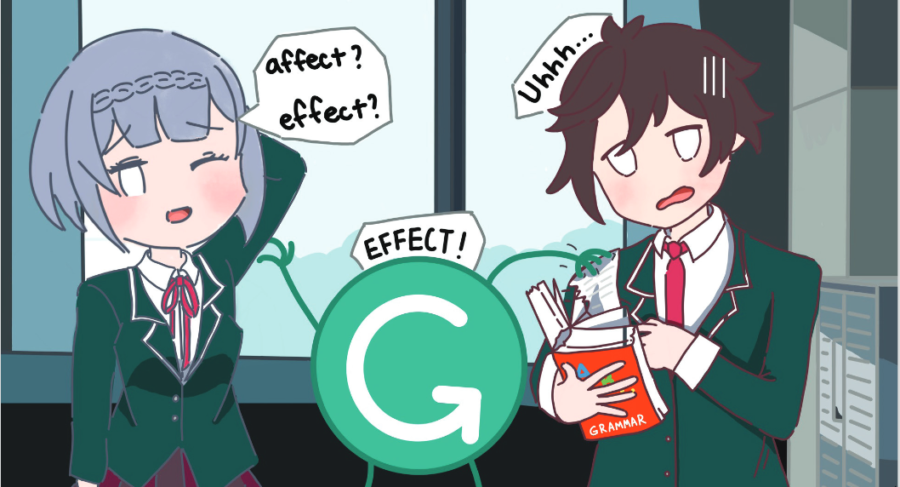by Evan Lu, Co-Editor-In-Chief
We may never know how it started. Some say the scourge came in 2009, from the offices of an adolescent technology startup. Three awkward software developers from Ukraine come up with the idea for a new technology to eliminate misspellings and grammatical mistakes from the world. Hunched over a disheveled desk that’s smudged with Cheeto dust, they pore over scribbled-upon napkins before releasing the first version of their creation: Grammarly.
Soon, Grammarly is everywhere. The company of three metastasizes into a pulsing cult of 600 employees, each sworn by blood oath to make texting, emailing and typing as mindless as possible. New initiates are lured in on LinkedIn by recruiters who, just the day before, had themselves been recruited through LinkedIn. The craze spreads.
Grammarly becomes smarter, cockier. It develops a mind of its own. Soon, it stops underlining words with red squiggles before changing them. It replaces “pie” with “pi” and “ice cream” with “I scream.” It writes books that take over the New York Times bestsellers list, driving human authors to extinction.
Humans lose their grasp on language, forgetting the most basic of tenets. The Feds try to intervene, only to discover it’s too late. When the military prepares for mobilization, the army’s highest ranked five-star general confuses “attack” and “retreat.” Congress achieves unprecedented bipartisan support on an anti-Grammarly bill, but it doesn’t pass because no senators remember how to sign their names. The president delivers a speech using the only words he can still remember: “snickerdoodle” and “aardvark.” In response, Grammarly crafts its own speech, complete with historical references and Yo Momma jokes. When put to music, it becomes the greatest diss track of all time. Grammarly rises to the top of the Billboard 100 and is named “Hottest New Rapper from North Menlo Park of 2033.”
By 2062, the final fragments of society dissolve. Grammarly rewrites the Constitution. Every piece of writing is by Grammarly–nothing human is untouched. The energy grid collapses under unending performance updates. America is dark. Devoid of organization and free thought, civilization crumbles.
It is now 2077, and I am a gaunt, old hermit. Looking up at the sky, I remember the days of my past. I had shown great promise as a journalist during my youth, only to forget how to write a sentence. I want it to stop. I want my old life back.
And then I have my first serious idea in decades. I will write something real, with my own mind. This piece I pen will have a function, and it will not be Grammarly-made. Others will see, learn and follow.
I jerk up from the ground, filled with excitement. I scramble to a decrepit building, dropping to my knees and searching through the rooms for something to write with. I dig through a dusty wooden desk, frantically, stumbling across a familiar yellow rod. A No. 2 Ticonderoga pencil. I hope to make a simple word and, with it, a better life.
But then it happens. I become confused. I can’t recall how to spell. I try to construct a sentence, pulling at the fringes of my mind for the right words, but to no avail. Why am I doing this, a human attempting such a menial task as writing? The pencil tumbles from my hand. “I could go for some pi or I scream,” I think to myself as I leave the building. All has fallen.
Evan Lu can be reached at [email protected].























































































